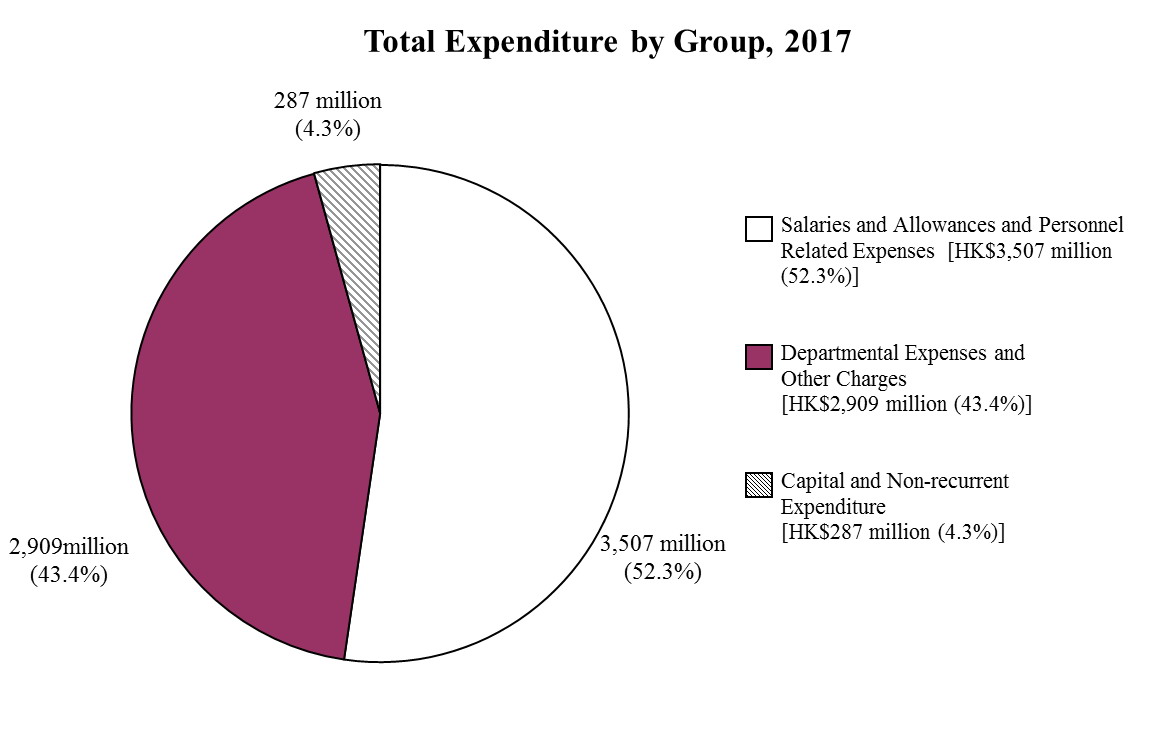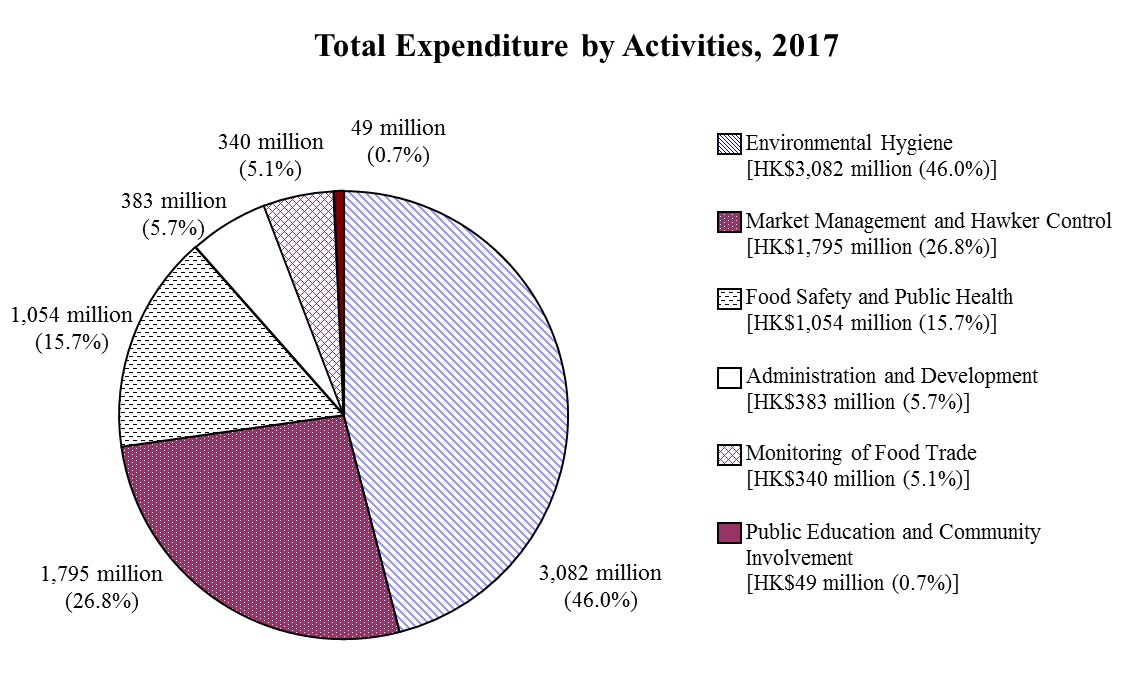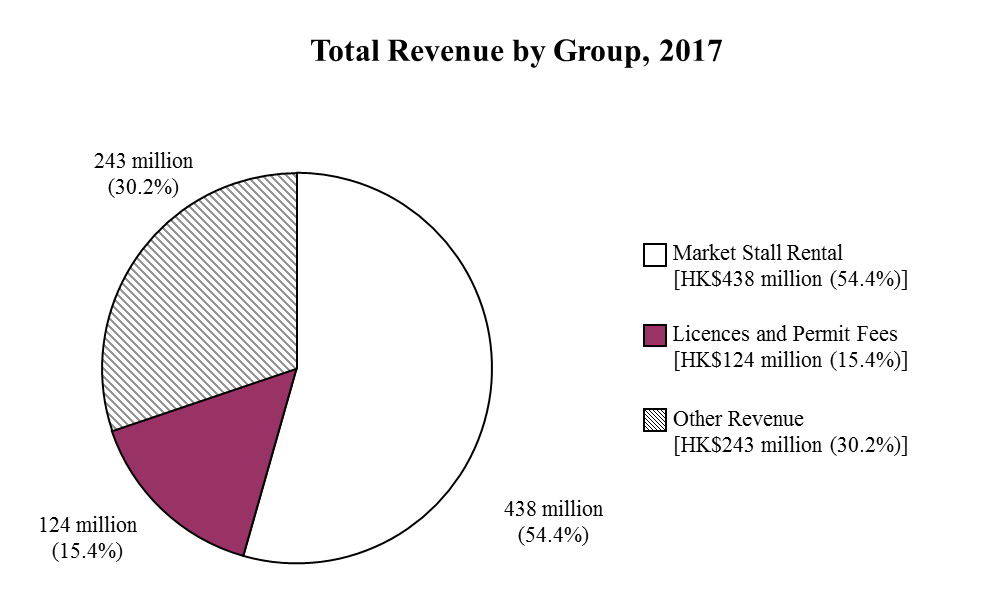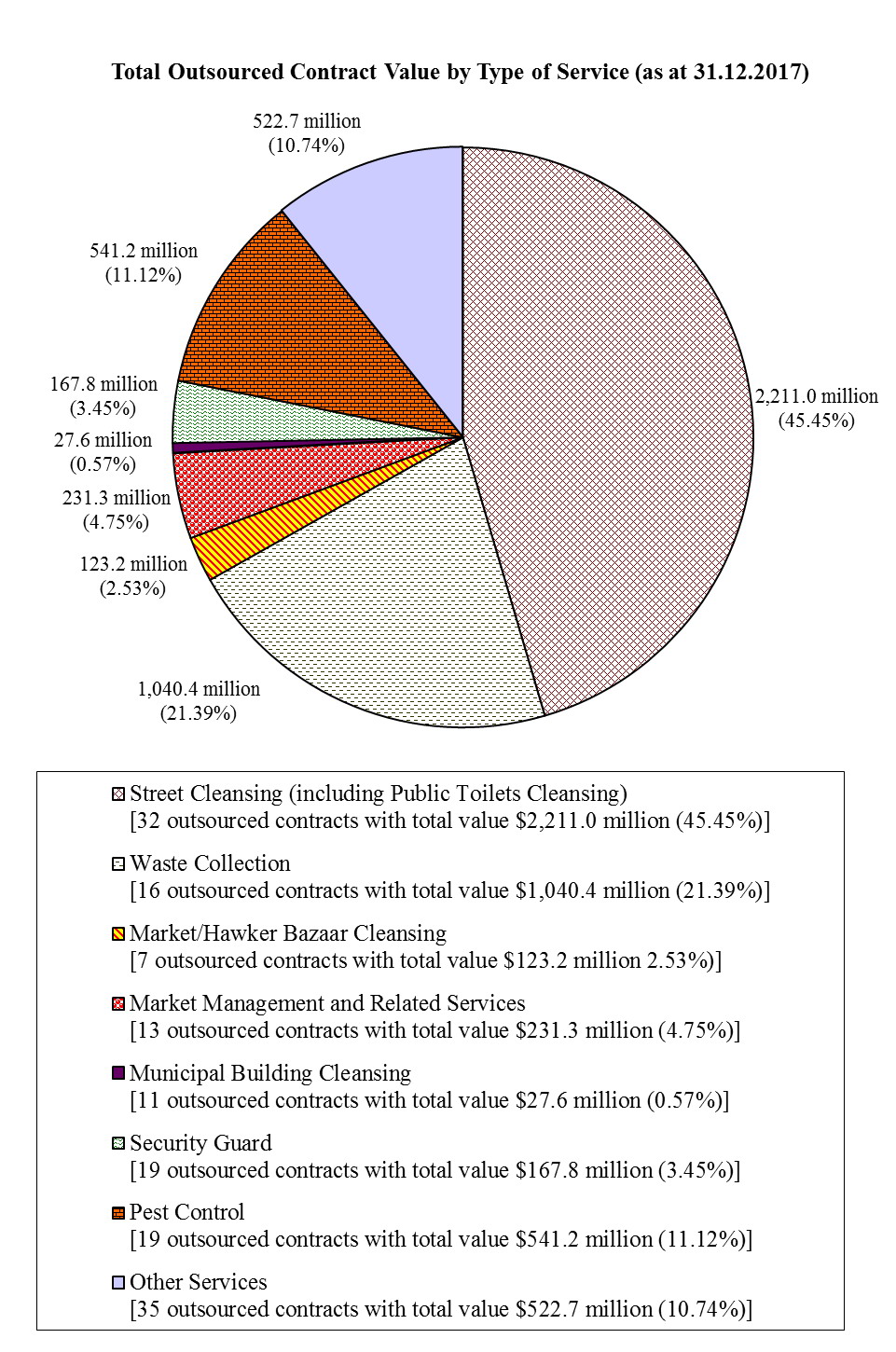The Administration and Development Branch provides various management and support services to the Department.
Grade Management
There are three major grades covering Health Inspectors, Hawker Control Officers and Foremen. Two grade managers, one for the Health Inspector grade and another for the Hawker Control Officer and Foreman grades, are responsible for staff matters involving manpower planning, career development, postings, promotion and training.
Health Inspectors are responsible for various duties concerning environmental hygiene and food safety, such as handling environmental nuisance cases, hygiene inspections to food establishments, licensing, prosecution, meat inspection, cleansing services, outsourcing, pest control, hawker control, management of markets, cemeteries and crematoria, food control and health education.
Hawker Control Officers are responsible for controlling on-street hawking activities, managing hawker permitted places and taking law enforcement action against illegal hawking activities. They also play an important part in prosecuting people who have committed cleanliness offences, such as littering and spitting.
Foremen are mainly responsible for supervising the work of frontline staff in street cleansing, waste collection, pest control, cemeteries and crematoria and market management. They are also responsible for transport services and monitoring the performance of the Department's service contractors. Members of the grade also take legal action against cleanliness offenders.
Training
Training and development programmes are designed to enhance individual and organisational performance in providing quality service for the public. The programmes provide leadership development opportunities, support departmental initiatives and bring out the best of staff for serving the public professionally. Programmes that heighten staff's awareness of occupational safety and health are also provided.
In addition to in-house trainers, experts in various fields were invited to conduct training to enable staff to keep abreast of the latest development in the relevant fields. While the majority of training programmes were held locally, staff members would also be nominated to attend overseas programmes.
During the year, the Department organised 621 classes, which were attended by 11,749 trainees, adding up to a total of 34,334 trainee-days. These included induction training programmes for a total of 794 new recruits to equip them with the necessary knowledge and skills to discharge their duties. In addition, the Department provided sponsorship to 5 staff members to pursue employment-related studies outside office hours, and 26 officers were placed in 17 training programmes outside Hong Kong, involving a total of 234 trainee-days.
Management Services
The Management Services, Survey and Statistics Section mainly provides management consultancy and statistical services to the Department. They help the management improve the delivery of public services, monitor the standard of performance and formulate policy in the provision of services and staffing. Ongoing consultancy services are provided to assist the Department in the implementation of recommendations of studies and technical advice is offered to help the Department conduct statistical surveys and analyse data. During the year, four management studies and three statistical surveys were completed.
Financial Management



All matters relating to expenditure and procurement, including payment processing, financial advice and monitoring, are handled by the Finance and Supplies Division.
In 2017, the Department spent $6,703 million, including $3,507 million on salaries and allowances and personnel related expenses, $2,909 million on departmental expenses and other charges, and $287 million on capital and non-recurrent expenditure.
By activities, the majority of the expenditure ($3,082 million) was on environmental hygiene. This was followed by $1,795 million on market management and hawker control, $1,054 million on food safety and public health, $383 million on administration and development, $340 million on monitoring the food trade, and $49 million on public education and community involvement.
During the year, the Department received a revenue of $805 million. Most of the revenue came from the rental of stalls in public markets managed by the Department ($438 million) and from licence and permit fees ($124 million). Other sources included revenue from cemeteries and crematoria services ($66 million), court fines and statutory penalties ($77 million), slaughterhouse and other concessions ($43 million), meat examination ($21 million) and miscellaneous services ($36 million).
Capital Works
In the Government's 2017 Capital Works Resource Allocation Exercise, the five-year allocation on capital projects for food and environmental hygiene services is estimated at $5,499 million to meet expenditure on projects of the department.
Refuse Collection Points
As part of the continuing efforts to improve Hong Kong's living environment, the Department is replacing temporary roadside refuse collection points (RCPs) with off-street facilities in enclosed buildings equipped with modern de-odourising installations.
The Department reprovisioned the RCP at Chung Hau Street in Kowloon City to MTR Corporation Limited's Ho Man Tin Station in 2017 and will complete the construction of two new RCPs at Hong Kong-Zhuhai-Macao Bridge Hong Kong Boundary Crossing Facilities and at Site IJ4 in Kai Tak Development in 2018. In-situ reprovisioning of the Camp Street Temporary RCP within a residential development and the Wing Hong Street Temporary RCP within a commercial development in Sham Shui Po will be completed in 2018 and 2023 respectively. In addition, the reprovisioning of the Shanghai Street Temporary RCP to Hau Cheung Street and reprovisioning of the Interim RCP at Hip Wo Street/Tung Yan Street to Hip Wo Street will be completed in 2020 and 2021 respectively.
Public Toilets
Under the Public Toilet Refurbishment/Improvement Programme, seven projects were completed in 2017 and another 99 are in progress or being planned. The construction of five new public toilets, namely Lung Kwu Tan Public Toilet, Tuen Mun Road Bus-bus Interchange (Kowloon Bound) Public Toilet, Siu Hong Public Toilet, Tin Fuk Road Public Toilet and Tat Wan Road Public Toilet, was completed in 2017.
Public Markets and Cooked Food Centres
The Food and Health Bureau commissioned a consultant to assist in developing proposals to improve the operating environment of public markets managed by the FEHD and the consultancy report was released in 2015. The consultant has recommended specific physical improvement proposals for six selected markets, namely Sheung Fung Street Market, Lockhart Road Market, Yau Ma Tei Market, Wing Fong Street Market, Tsuen Wan Market and Ngau Chi Wan Market. Among them, improvement works for Sheung Fung Street Market and Lockhart Road Market will be completed in 2018 and 2019 respectively. The Department will continue to liaise with concerned parties to take forward the improvement works for the remaining four markets.
As at the end of 2017, tenants of a total of 11 markets/cooked food centres supported the retrofitting of air-conditioning systems. The Department will follow up on the related work.
Cemeteries, Crematoria and Columbaria
The Government is exploring all feasible measures to increase the supply of public columbarium facilities. These include promoting district-based columbarium development scheme and providing additional niches in existing cemeteries and columbaria. Among the 24 potential sites in 18 districts identified for columbaria development, the Department has secured support from relevant District Councils for 14 projects so far which account for about two-thirds of the total number of new niches under planning. The Government will expedite the development of public columbaria on these shortlisted sites to meet the increasing demand. Construction works for provision of columbarium facilities at Wong Nai Chung Road (provision of about 855 niches in late 2018), at Wo Hop Shek Cemetery Phase 1 Development (provision of about 44,000 niches in late 2019) and at Tsang Tsui (provision of about 160,000 niches in 2019) as well as site formation and associated infrastructural works for development of columbarium at Sandy Ridge Cemetery (provision of about 200,000 niches by batches starting from 2024) are underway. Besides, extensions of the existing Cheung Chau Columbarium (provision of about 1,400 additional niches in 2019) and Peng Chau Columbarium (provision of about 360 additional niches in 2018) are in progress.
Outsourcing of Services

Grand Total: 152 contracts with a total value of $$4,865.2 million
By end 2017, 152 contracts valued at $4,865.2 million were in force for the provision of services by private contractors. The outsourcing policy is aimed at greater cost-effectiveness and flexibility in the delivery of services.
Examples of outsourcing services include: street cleansing, waste collection, mechanical street sweeping, mechanical gully cleansing, collection of recyclables, market management, cleansing, pest control and related services, rodent, mosquito and other pest control services, municipal services building cleansing, security guard services, animal carcass collection, cleansing and horticultural maintenance services for cemeteries and columbaria, tree risk assessment and arboricultural services, etc.
Measurable performance standards are written into contracts to ensure the quality of services provided. Labour protection and occupational safety clauses have also been included in contracts to safeguard the rights and promote the well-being of non-skilled workers. In addition to daily checking on the relevant records, surprise site inspections are conducted to ensure compliance with contract requirements by contractors at all times.
Complaints Management
The Complaints Management Section is responsible for formulating and reviewing policies on, and procedures for, handling all types of complaints. In 2017, the Department received 219,650 cases of service request and complaint from the public.
Quality Assurance
Continuous improvement is one of the priority tasks of the Department to ensure provision of quality services to the public.
The primary objective of the Quality Assurance Section is to monitor and improve service quality. To achieve this objective, the section conducts day-to-day regulatory inspections on services provided by the Department and service contractors. Recommendations are made for improvements to services with identified inadequacies in existing operational systems, procedures and guidelines. The section also recommends good performers for Quality Assurance Awards and Certificates of Meritorious Performance to give recognition to outstanding and hardworking frontline staff. In addition, the section investigates staff-related cases of dereliction of duty and employment-related complaints of service contractors in an independent, objective and fair manner. The section also conducts audit inspections and employment-related inspections to check service contractors' compliance with employment-related commitments.
Public Education and Publicity
Public education plays an important role in ensuring food safety, improving environmental hygiene and promoting green burial as a more sustainable form of disposal of cremated human ashes. To this end, the Department organises publicity and educational programmes including talks, exhibitions and outreaching programmes to enhance the general public's awareness of these issues.
The Department operates a Health Education Exhibition and Resource Centre (the Centre) inside Kowloon Park to serve the public. It arranges group visits and guided tours for schools, elderly centres, other non-government organisations and the public. Talks and outreaching activities are also conducted regularly. In March 2017, the photo gallery of the Centre was revamped to highlight existing and past Keep Hong Kong Clean campaigns and publicity cartoon figures. During the year, the Centre attracted 93,724 visitors, and organised 1,071 talks-cum-activities for kindergartens, primary schools and secondary schools, 968 talks for elderly centres and 336 talks for the general public. The Mobile Education Centre (a publicity vehicle) also conducted 218 visits to schools, housing estates and public parks as part of the outreaching efforts in promoting health education.
To meet the targeted risk communication needs on food safety, there is also a dedicated Communication Resource Unit (CRU) under the Centre for Food Safety to serve the public and the food trade. Located at the Fa Yuen Street Municipal Services Building, the CRU maintains a collection of food safety related promotion resource materials. It has designated exhibition and information corners equipped with audio-visual facilities. The CRU also entertains requests for organised visits and food safety talks, and provides loan service of resource materials, exhibition boards and audio-visual resources for schools, community centres and other interested public. Apart from supporting initiatives and events on food safety risk communication, the CRU conducts regular education programmes throughout the year. In 2017, the CRU conducted 335 seminars, workshops and various types of publicity activities including roving exhibitions on food safety for the public and selected target groups, including food handlers, school children, the elderly and ethnic minorities.
During the year, the Department continued its publicity on environmental hygiene, food safety and green burial through Television and Radio Announcements in the Public Interest, social media such as Facebook and YouTube, mobile applications, banners, posters, pamphlets and leaflets, as appropriate. To strengthen promotion of Keep Hong Kong Clean messages, Keep Clean Ambassador Ah Tak and a dedicated Facebook page were created. By sharing photos, videos and various information on personal, household and environmental hygiene on the Facebook page and Ah Tak's presence at public functions and community events, the Department appealed to the public for their co-operation and support in keeping Hong Kong clean. Anti-rodent and anti-mosquito campaigns were organised to solicit public support and participation in pest control. Support was also given to cleansing campaign/work by non-governmental organisations.





